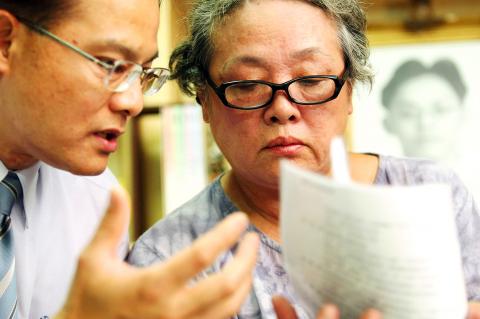A military court yesterday acquitted Chiang Kuo-ching (江國慶), who was executed for the rape and murder of a girl 15 years ago, in a posthumous trial.
Chiang was executed in 1997 after being convicted of sexually abusing and murdering a five-year-old girl.
The Military Northern District Court yesterday morning handed down the ruling after the Military Supreme Court Prosecutors’ Office filed an extraordinary appeal with the Military Supreme Court in May last year to reopen the case.

Photo: Liao Chen-huei, Taipei Times
The Military Supreme Prosecutors’ Office’s legal action followed findings by the Control Yuan that Chiang had been tortured by military investigators.
The Ministry of National Defense yesterday said it was the final verdict and it would help Chiang’s family apply for national compensation.
The ministry said the court ruled that Chiang’s statements were made against his will and that the blood-soaked toilet paper and knife used as evidence against Chiang were re-examined by forensic experts, who concluded that they could not prove Chiang’s involvement in the murder.
Shen Shih-wei (沈世偉), an official with the ministry’s Judicial Department, visited Chiang’s mother Wang Tsai-lien (王彩蓮) at her apartment yesterday afternoon and delivered a copy of the ruling.
Wang’s attorney Greg Yo (尤伯祥) and two other attorneys were in the court to hear the ruling.
Yo said Chiang’s family is expected to receive about NT$100 million (US$3.3 million) in compensation.
Yo, who also represented the Judicial Reform Foundation, called on Taipei district prosecutors to quickly complete an investigation into the role and responsibility of former minister of national defense Chen Chao-min (陳肇敏) and other military officers in the wrongful execution.
Yo said Chen was the mastermind behind the botched investigation of Chiang’s case.
In an interview in the morning, Wang said: “I will bring the acquittal ruling to my son and my husband’s shrines.”
She added she would not forgive those military officials responsible and wanted to see the verdicts against former air force counterintelligence official Ko Chung-ching (柯仲慶) and others.
The Supreme Prosecutors’ Office Special Investigation Division concluded on May 24 that Chiang, who was serving in the air force command in 1996 at the time of the murder, was not guilty of the crime.
Chiang was executed at the age of 21.
The Supreme Prosecutors’ Office has since charged a new suspect, Hsu Jung-chou (許榮洲), with the girl’s murder.
Prosecutors said Chiang was tortured during questioning, including exposure to strong lights and being forced to watch a video of the girl’s autopsy. He was also threatened with an electric prod and deprived of sleep while being forced to undergo strenuous physical activities.
Prosecutors said Hsu left bloody palm prints at the scene of the crime, which a DNA test confirmed were his.
Hsu’s case is pending in the Taipei District Court.

Taiwan is to commence mass production of the Tien Kung (天弓, “Sky Bow”) III, IV and V missiles by the second quarter of this year if the legislature approves the government’s NT$1.25 trillion (US$39.78 billion) special defense budget, an official said yesterday. Commenting on condition of anonymity, a defense official with knowledge of the matter said that the advanced systems are expected to provide crucial capabilities against ballistic and cruise missiles for the proposed “T-Dome,” an advanced, multi-layered air defense network. The Tien Kung III is an air defense missile with a maximum interception altitude of 35km. The Tien Kung IV and V

The disruption of 941 flights in and out of Taiwan due to China’s large-scale military exercises was no accident, but rather the result of a “quasi-blockade” used to simulate creating the air and sea routes needed for an amphibious landing, a military expert said. The disruptions occurred on Tuesday and lasted about 10 hours as China conducted live-fire drills in the Taiwan Strait. The Civil Aviation Administration (CAA) said the exercises affected 857 international flights and 84 domestic flights, affecting more than 100,000 travelers. Su Tzu-yun (蘇紫雲), a research fellow at the government-sponsored Institute for National Defense and Security Research, said the air

Taiwan lacks effective and cost-efficient armaments to intercept rockets, making the planned “T-Dome” interception system necessary, two experts said on Tuesday. The concerns were raised after China’s military fired two waves of rockets during live-fire drills around Taiwan on Tuesday, part of two-day exercises code-named “Justice Mission 2025.” The first wave involved 17 rockets launched at 9am from Pingtan in China’s Fujian Province, according to Lieutenant General Hsieh Jih-sheng (謝日升) of the Office of the Deputy Chief of the General Staff for Intelligence at the Ministry of National Defense. Those rockets landed 70 nautical miles (129.6km) northeast of Keelung without flying over Taiwan,

City buses in Taipei and New Taipei City, as well as the Taipei MRT, would on Saturday begin accepting QR code payments from five electronic payment providers, the Taipei Department of Transportation said yesterday. The new option would allow passengers to use the “transportation QR code” feature from EasyWallet, iPass Money, iCash Pay, Jkopay or PXPay Plus. Passengers should open their preferred electronic payment app, select the “transportation code” — not the regular payment code — unlock it, and scan the code at ticket readers or gates, General Planning Division Director-General Liu Kuo-chu (劉國著) said. People should move through the